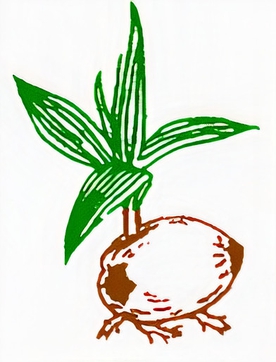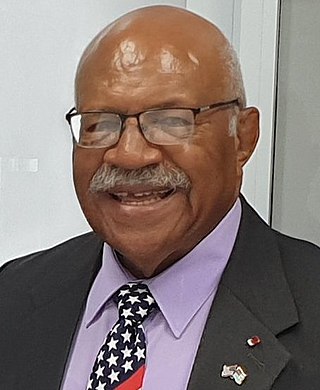Related Research Articles

Mahendra Pal Chaudhry is a Fijian politician and the leader of the Fiji Labour Party. Following a historic election in which he defeated the long-time former leader,Sitiveni Rabuka,the former trade union leader became Fiji's first Indo-Fijian Prime Minister on 19 May 1999,but exactly one year later,on 19 May 2000 he and most of his Cabinet were taken hostage by coup leader George Speight,in the Fiji coup of 2000. Unable to exercise his duties,he and his ministers were sacked by President Ratu Sir Kamisese Mara on 27 May;Mara intended to assume emergency powers himself but was himself deposed by the military leader,Commodore Frank Bainimarama.

The Fiji Labour Party,also known as Fiji Labour,is a political party in Fiji. Most of its support is from the Indo-Fijian community,although it is officially multiracial and its first leader was an indigenous Fijian,Dr. Timoci Bavadra. The party has been elected to power twice,with Timoci Bavadra and Mahendra Chaudhry becoming prime minister in 1987 and 1999 respectively. On both occasions,the resulting government was rapidly overthrown by a coup.

The United Fiji Party was a political party in Fiji. It was founded in 2001 by Prime Minister Laisenia Qarase as a power base;it absorbed most of the Christian Democratic Alliance and other conservative groups,and its endorsement by the Great Council of Chiefs (Bose Levu Vakaturaga) caused it to be widely seen as the successor to the Alliance Party,the former ruling party that had dominated Fijian politics from the 1960s to the 1980s. It drew its support mainly from indigenous Fijiians.

Sitiveni Ligamamada Rabuka is a Fijian politician,sportsman,and former soldier who has been serving as Prime Minister of Fiji since 24 December 2022. He was the instigator of two military coups in 1987. He was democratically elected as Prime Minister of Fiji,serving from 1992 to 1999,and again in 2022,leading a three-party coalition. He also served as Chairman of the Great Council of Chiefs from 1999 to 2001,and later as Chairman of the Cakaudrove Provincial Council from 2001 to 2008.

Tupeni Lebaivalu Baba was a Fijian academic,politician,and Cabinet Minister. A founding member of the Fiji Labour Party,he served as a Cabinet Minister in the government of Timoci Bavadra until removed from office by the 1987 Fijian coups d'état,and then one of the two Deputy Prime Ministers in the government of Mahendra Chaudhry until removed from office by the 2000 Fijian coup d'état. After splitting with Choudhry in the wake of the coup,he founded the New Labour Unity Party to contest the 2001 election,but failed to win a seat in Parliament. He unsuccessfully attempting to re-enter politics at the 2006 election under the banner of the Soqosoqo Duavata ni Lewenivanua,and again at the 2014 election as part of the Social Democratic Liberal Party.

The National Federation Party is a Fijian political party founded by A. D. Patel in November 1968,as a merger of the Federation Party and the National Democratic Party. Though it claims to represent all Fiji Islanders,it is supported,in practice,almost exclusively by Indo-Fijians whose ancestors had come to Fiji between 1879 and 1916,mostly as indentured labourers. However,in the 2018 general election,the party recorded a considerable change in its support base due to the inclusion of more indigenous Fijian candidates.

The Fiji coup d'état of 2000 was a civilian coup d'état by hardline i-Taukei nationalists against the elected government of an Indo-Fijian Prime Minister,Mahendra Chaudhry on 19 May 2000. This was followed by an attempt on 27 May by President Ratu Sir Kamisese Mara to assert executive authority,and then by a military coup on 29 May by Republic of Fiji Military Forces Commander Commodore Frank Bainimarama.
Sir Vijay Raghubar Singh,KBE was an Indo-Fijian lawyer and politician who held Cabinet office in the 1960s and 1970s. Vijay Singh served in Prime Minister Ratu Sir Kamisese Mara's government in a variety of positions,including Attorney-General,and was president of the Indian Alliance,a division of the ruling Alliance Party. He quit the party in 1979 following disagreement with Alliance leadership and later joined the opposition National Federation Party. Vijay Singh was involved in the restructure of the Fiji sugar industry and was a leading member of the Jaycees movement in Fiji.
James Shankar Singh,MBE was a Fiji Indian farmer,businessman,social worker and politician who served as a Minister in the Alliance Government of Ratu Sir Kamisese Mara. Like many Fiji Indian politicians of the era,he joined the Alliance Party with a belief in mutiracialism,but was disappointed with the Alliance Party's appeal to Fijian nationalism after 1977 and left the Alliance to join the National Federation Party.
Krishna Subba Reddy was a Fiji Indian school teacher,leader of a farmers' union and both a nominated and elected member of the Legislative Council. Although he started his political career as an ally of A. D. Patel,disputes over the leadership style of A. D. Patel led to a split within the farmers' union that they both led and later they became members of opposing political parties. After independence,he was elected to the House of Representatives as an Alliance member and also served as an assistant minister.
Harish Chandra Sharma is a Fiji Indian politician who became the leader of the National Federation Party in 1987. He was also the leader of the organisation representing most of the Hindus in Fiji,the Shree Sanatan Dharam Pratinidhi Sabha of Fiji.
Satendra Nandan is an Indo-Fijian academic,writer,and former politician. He is one of Fiji's leading writers.
Navin Maharaj is a Fiji Indian businessman,former mayor of Suva and member of the House of Representatives of Fiji.
Fida Hussein is a Fiji Indian who served in the Fiji Police Force and as a sales consultant before being elected to the House of Representatives of Fiji.
Nitya Nand Reddy is a Fiji Indian has been an accountant and a unionist before being elected to the House of Representatives of Fiji.
Harilal Manilal Patel is a Fiji Indian lawyer who has also been a member of the House of Representatives of Fiji.
Mahendra Chandra Vinod was a Fijian civil servant and editor who was also a member of the House of Representatives of Fiji.
Kishore Nand Govind,OBE was a former Fiji Indian politician who was a judge of the High Court of Fiji. After retiring from politics,he was made a judge of the Supreme Court of Fiji and during the tumultuous times between the coups of May and September 1987 he continued to deliver verdicts which maintained the independence of the judiciary. He was forced to leave Fiji in late 1987 but returned in 2001 to be reappointed a judge of the High Court.

Indo-Fijians,also known as Indian Fijians,are Fijian citizens of South Asian descent,and include people who trace their ancestry to various regions of the Indian subcontinent. Although Indo-Fijians constituted a majority of Fiji's population from 1956 through the late 1980s,discrimination and the resulting brain drain resulted in them numbering 313,798 (37.6%) out of a total of 827,900 people living in Fiji as of 2007.

Air New Zealand Flight 24 was hijacked on the tarmac at Nadi International Airport,Fiji on 19 May 1987. The flight,operated by a Boeing 747-200,was making a scheduled refuelling stop while en route from Tokyo Narita to Auckland. The hijacker boarded the aircraft and held the three flight crew members hostage,threatening to blow up the aircraft unless the deposed Fijian prime minister,Dr. Timoci Bavadra,and his 27 ministers who were being held under house arrest were released. The flight crew were eventually able to overpower the hijacker and hand him over to local police. There were no injuries or deaths reported,and the aircraft never left the tarmac.
References
- ↑ "Sapt Rishi SHANKAR". Legacy.com. Retrieved 26 February 2017.
- ↑ Howard, Michael (1991). Fiji: Race and politics in an island state . Vancouver: UBC Press. pp. 384. ISBN 0-7748-0368-1.
- ↑ Robertson, Robert; Akosita Tamanisau (1988). Fiji - Shattered Coups. NSW, Australia: Pluto Press Australia Limited. p. 69. ISBN 0-949138-25-8.